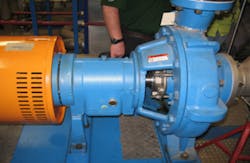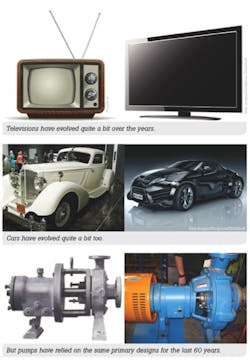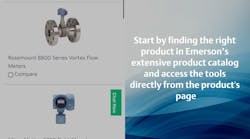(a.k.a. "The Pump Guy")
The pace of life continues to accelerate every day.
When the “Pump Guy” was a “Pump Kid” in Alabama, we ate lunch at school. We would meet as a family at the breakfast and dinner table. The TV was off. We had a home telephone, but no one would call because they were also at home eating dinner with the TV off.
Nowadays, family members grab a breakfast bar from the fridge and gulp a glass of nondescript exotic juice-like drink over the sink. In the evenings, we demonstrate family etiquette with “please” and “thank you” as we hog the microwave.
As a pre-teen “Pump Geek,” I played games like checkers, chess, Monopoly, and Scrabble. We called them board games. Today, those are called “bored” games. My children have their own personal electronic games that they play on their own personal screens.
Yes, times are a-changin, and this brings me to this month’s “Pump Guy” article. In a world where entire industries have disappeared or been seriously marginalized because they were unable to keep up with the pace of innovation, I think it’s time we started rethinking how pumps are designed. Allow me to elaborate.
Recently, I was looking at some pump and valve pictures from the Second World War. The pumps and valves look the same today as they did in the 1940s. Oh yes, today’s pumps may have new construction materials and finite element analysis, but the basic design of impellers, volutes, and flanges has been the same for the last 60 years. The molds and castings haven’t changed. Compare this to how automobiles, telephones, and televisions have evolved during this same time period.
If an automatic dish washing machine will take a load of dirty dishes, apply the soap, heat the water, scrub and wash the dishes while grinding and flushing the crumbs, rinse and dry the dishes, then why can’t today’s pump industry design a product that will allow a petroleum company to automate the refining process?
Why can’t a refinery use an automated pump solution to convert a load of crude oil into gasoline or diesel, using VFDs, controllers, sensors, transducers, and other integrated electronics, software, and process equipment? Push a button and refine crude oil into gasoline with minimal or no human intervention. Push a button and homogenize, pasteurize, chill, and bottle a batch of cow’s milk into whole milk, skim milk, chocolate milk, cheese, or cream with no human intervention.
Today’s pump industry ships new pumps to their customers with no gauges or other instrumentation. Would you buy a TV without a remote control? Would you buy a car without a dashboard control panel? Why do we accept our process pumps with absolutely no instrumentation?
I have asked many pump manufacturers why they continue to ship pumps that haven’t changed in 60 years, and why in 2014 they continue to ship product without instrumentation. They tell me that the gauges would be damaged in shipment because they hang off the side of the pump and would be knocked off in shipment.
Well, maybe we should tell the automobile companies that they should stop shipping cars with side mirrors and antennas because they might be damaged in shipment and would arrive broken to the car dealerships. That makes sense, right?
The kitchen stove evolved into the microwave. The broom evolved into the vacuum cleaner. Rail travel became air travel. The typewriter became the computer.
Process pumps will evolve too, but only when process engineers refuse to take delivery on pumps without instrumentation and electronics to interface with other equipment and automation software.
I invite you to attend an upcoming Pump Guy Seminar this year. For more details, visit the Pump Guy Seminar page or contact Matt Migliore at [email protected] or 610 828-1711.
Larry Bachus, founder of pump services firm Bachus Company Inc., is a regular contributor to Flow Control magazine. He is a pump consultant, lecturer, and inventor based in Nashville, Tenn. Mr. Bachus is a retired member of ASME and lectures in both English and Spanish. He can be reached at [email protected].




